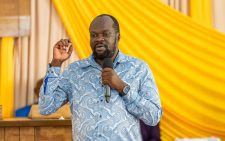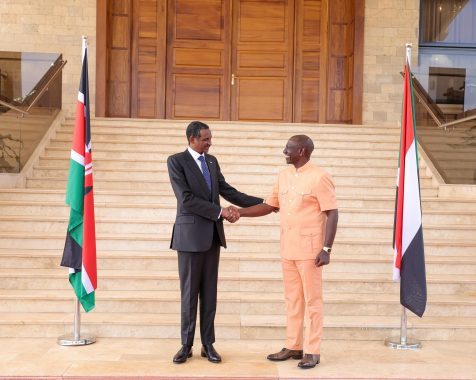Fate of Parliament lies in the hands of five judges

The fate of 416 Members of Parliament (MPs) now lies in the hands of a five-judge Bench set up by Deputy Chief Justice Philomena Mwilu to hear cases against a petition seeking the dissolution of National Assembly.
Various parties, including the National Assembly and Senate, have sued Chief Justice David Maraga following his advisory to President Uhuru Kenyatta to send MPs home for failing to pass laws to implement the two-thirds gender rule.
The five High Court judges that could save or send the MPs packing are Lydia Achode, who is the Presiding Judge, George Odunga, James Makau, Anthony Ndung’u and Pauline Nyamweya.
While making the announcement, the Judiciary was keen to stress that the judges were appointed by the Deputy Chief Justice and not Maraga, who is a party to the matter.
The CJ is the first respondent in the petition and is, therefore, expected to argue his case when the matter is heard.
The quintet is expected to sit on Wednesday next week to listen to all the parties in the petitions and give directions.
“Note that it is the DCJ and not the CJ who appointed the judges. The CJ, being a respondent to the petitions, could not appoint the Bench,” read a statement from the Judiciary.
While ordering the constitution of the bench, High Court judge Weldon Korir noted that Maraga’s advisory was expected to trigger action by the President without any further steps being taken, adding that once the President acted any petition would be rendered nugatory.
“It is also important to observe that it is in the public interest not to subject the country to parliamentary elections before exhaustively interrogating the constitutionality of the decision of the Chief Justice.
The public interest, therefore, supports the issuance of conservatory orders,” read Korir’s order.
The CJ’s advisory has sent shockwaves across the country over the fate of the legislators with top lawyers expressing fears that the decision to dissolve the two Houses would render all the laws passed by the 12th Parliament null and void.
Rarieda MP Otiende Amollo, who is also the vice-chairman of the Justice and Legal Affairs Committee, had warned that chances of the two Houses being dissolved are real.
“As it stands now, Parliament is now null and void and whatever business that has been legislated is null and will not count. It is that serious,” he said.
Constitutional experts also warned that the President had no option, but to dissolve Parliament as advised by the CJ even as a number of legislators cried foul.
“The decision to dissolve Parliament is mandatory. Article 261 of the Constitution is clear that he has no options,” said Senior Counsel Nzamba Kitonga, who chaired the Committee of Experts that put together the 2010 Constitution.
A scrutiny of the bench appointed yesterday reveals a mix of moderate and controversial judges.
The soft spoken Justice Achode, who once served as a commissioner of the Judicial Service Commission (JSC) as Registrar of the High Court, has expertise in gender and family law, having adjudicated on the two areas for more than 20 years.
Justice Odunga, a known stickler to the law, has previously rubbed the establishment the wrong way through his controversial rulings.
He was also in the eye of a storm when he quashed the awarding of a tender to print presidential ballot papers to the Dubai-based Al-Ghurair firm in the run-up to the last general election.
His peers argue that the Machakos-based judge has demonstrated a tendency to interpret the Constitution in a manner that expands freedoms and enforces adherence to the law.
A former University of Nairobi law lecturer, Justice Nyamweya applied for the post of Deputy Chief Justice but pulled out before the main interviews because of Maraga’s candidature.
The two come from the same ethnic community. Judge Nyamweya is the presiding judge of the Judicial Review Division at the Milimani Law Courts.
Justice Makau, on the other hand, is known for making controversial rulings.
He is the judge who temporarily suspended flights from China at the onset of the coronavirus pandemic. He is currently based at the Milimani Constitutional Court.
Admission
Justice Ndung’u, who is based in Kisii, is known for his landmark ruling ordering the admission of medical students selected by both the Kenya Medical Training College (KMTC) and the Kenya Universities and Colleges Central Placement Service.
The two government institutions have been fighting for the control of student selection.
Justice Ndung’u, directed that all the applicants, who were selected by the two bodies, be admitted.
CJ Maraga, on September 21, 2020, said Parliament had failed to comply with the High Court order to enact legislation required to implement the two-thirds gender rule for over nine years.
“Let us endure pain if only to remind the electorate to hold their parliamentary representatives accountable.
There is no doubt the dissolution of Parliament will cause inconvenience and even economic hardship,” he said.
Apart from Parliamentary Service Commission (PSC), other petitioners in the matter include Attorney General, Third Alliance Party, High court lawyer Adrian Kamotho Njenga and two citizens, Leinah Konchellah and Mohsen Munasar.
The petitioners want the court to stop the dissolution of Parliament until their petitions are heard and determined. Judge Korir had last month issued orders suspending the implementation of the CJ’s advisory to the President pending the hearing of the cases.
He argued that the matters raised by the litigants were weighty constitutional issues.












